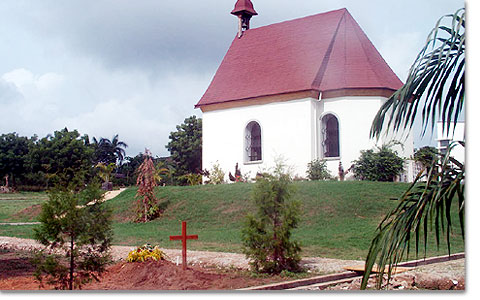
|
| Tumba a la sombra del Santuario de Ibadan, Nigeria Tomb in the shadow of the Shrine in Ibadan, Nigeria Grab im Schatten des Heiligtums von Ibadan, Nigeria |
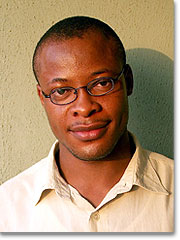 |
|
| Vitalis Ifeanyi Onyenedum Vitalis Ifeanyi Onyenedum Vitalis Ifeanyi Onyenedum |
|
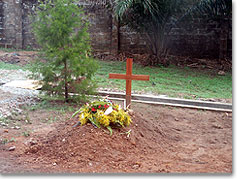 |
|
| Semilla para Schoenstatt en Nigeria Seed for Schoenstatt in Nigeria Saatkorn für Schönstatt in Nigeria |
|
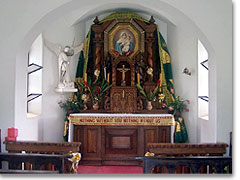 |
|
| Al lado derecho, una foto de Vitalis – y la Virgen Peregrina At the right side, a photo of Vitalis – and the Pilgrim MTA Rechts ein Foto von Vitalis – und die Pilgernde Gottesmutter |
|
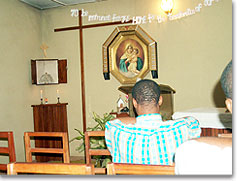 |
|
| Vitalis durante la adoración Vitalis during adoration Vitalis bei der Anbetung Fotos: P. Alfred Kistler © 2007 |
|
NIGERIA, Fr. Alfred Kistler/mkf. It was a special day for Schoenstatt in Nigeria. Bro. Vitalis Ifeanyi Onyenedum who died on 23th of April, was buried on 4th of May close to the Schoenstatt Shrine that he had loved so much. He championed the spread of the Pilgrim MTA apostolate in Nigeria, and committed much time to build Schoenstatt Youth in some parishes. He offered his sickness as a seed for the fruitfulness of the Shrine at Ijokodo. On May 31, 2000 he sealed his Covenant of Love with the Mother Thrice Admirable of Schoenstatt and lived it out in a genuine way and was deeply attached to Our Lady.
"The death of Bro. Vitalis came so suddenly, so unexpectedly, as a great surprise not only for those further away but also for those who could accompany him the last week of his life", said Fr. Alfred Kistler in the funeral Mass. "With great respect and admiration we have also experienced the great faith of members of his family when they received the sad news of the passing away of their brother; after a short time of reflection they said: Glory be to God!
Even with such a faith the question remains: Why so early? Why? Why?
The Book of Wisdom knows the feelings of the heart and answers: ‘Yet people look on, uncomprehending; it does not enter their heads that grace and mercy await the chosen of the Lord, and protection his holy ones.’ The second reading clarifies to which great hope and joy God’s mercy and grace are leading us: ‘We shall stay with the Lord for ever. With such thoughts as these comfort one another.’
If we see that it is God’s mercy that offers us such promises and such a future then we begin to understand that behind all events there is not a blind fate or only an almighty powerful God but the kindest love of God who is a loving Father. This most kind love of the Father-God has called Vitalis away from earth. We may now savour what Divine Wisdom told us in the first reading: ‘His soul pleasing to the Lord, he has taken him quickly from the wickedness around him.’ ‘He has been carried off so that evil may not warp his understanding or treachery seduce his soul.’ ‘He has sought to please God, so God has loved him.’
I would even like to speak of a jealous love of God that didn’t want to loose this soul, a love that was longing for him and was transforming into saving light his life, his passions and all dangers surrounding him."
The young Nigerian, not yet 30 years old, belonged to the community of the Schoenstatt Fathers until for health reasons he had to give up his wish to become a priest.
Rooted in Divine Providence
On a picture of Mary that accompanied him he pasted a paper with his handwriting: Thou can a woman forget her baby at the breast or fail to cherish the son of her womb? Yet even should she forget, I will never forget you!’(Is. 49,15).
In a reflection entitled "Patience with Providence", Vitalis wrote a little more than a year ago: ‘I want, as a foundation for other things, to share with you a conclusion I reached after many experiences: Providence has defined certain events of my life and has made sure that it happens that way. Thus I interpret my Mum’s transition few days to our first reporting to the community as a part of Divine Providence: That I might see the community as my new home. This was confirmed by the affection I received from the brothers.’
In the same text later on: ‘This pattern of life, of relinquishing all rights and freedom to the Divine Will have affected my vision for the future or rather reshaped it. In other words, it is not a lazy relaxation believing that God will take care of everything even when I don’t cooperate. It is taking courage and moving on while being willing to cooperate with Divine Will. And this, I would say, equally forms the basis of the challenges in the future. It’s a quite huge leap in the dark, however, but in all these, faith in Divine Providence remains the only permanent and secure source of strength.’
This was not written as a theological treaty but as a reflection on his life and as a guideline for the future. In this light he was able to accept all insecurity about his vocation when he got sick during his first year of philosophy. A very serious liver problem affected him for the first time and brought him close to death. Not sure if he would ever become a priest he was sure that his life is in God’s hand and that it would be meaningful as priest or as layman.
In February of this year he wrote in a letter to Father Kistler: ‘For long I have discovered and experienced that I enjoy a high level of protection; protection in different aspects. From this realization I have gotten lot of courage to go on with whatever I undauntedly want to do. Often in my reflections I do conclude with thanksgiving that despite all odds I am not abandoned; I am not left alone to myself. And I discovered too that certain times, my personal freedom of action is withdrawn just to prevent me from what I might regret in the future. Although I asked for it, I was amazed that the request was answered’.
Despite the experience of special protection the harassing question remained: What is my mission? In the same letter he continues:
‘I have to confess that I am somewhat special but how, is what I can’t really explain. I have tried to understand to whole game but the more I try to do so, the more it slips away. I can’t understand. Equally, I experience a lot of difficulties trying to find out what precisely God and Mum want of me. It has really a difficult one. I really feel special but I don’t know yet why I am made special.’
Smiling
In the midst of such questions he remained a smiling man! Many of the brothers have been touched and surprised by his smile. In different situations, encountering people, problems and insecurities, he was smiling. Even the day before his death they met him sitting smiling on his bed. He was not worried about his death and his future: he was smiling. He was deeply rooted and secure in God’s hand, in His loving Providence. At the same time he was like a man keeping a secret in his heart, living a secret, being united with his God but asking him: what do you want from me, what is my mission, what’s the game?
"I dare to guess that the kind of faith in Divine Providence he lived and how he was sheltered in it was a special gift of the Holy Spirit. It was not a natural faith, not any more an ordinary faith; it was a supernatural faith that grows in a soul through special assistance of the Holy Spirit. And I believe that this gift was also the fruit of his covenant of love with Mary", said Father Kistler in the homily. "The Church’s experience knows that the Holy Spirit likes to come to places where he discovers Mary. In the heart of Vitalis he found Mary."
In his text "Patience with Providence" we find the passage: ‘The next in the chain of experiences was the covenant of love, which seems to me as a fruitful beginning to this journey.’
Another Joseph Engling for Nigeria?
"I remember the situation when I asked him whether the thought of becoming a saint was alive in him already before joining the community", Father Kistler shared during the funeral, "or if it came up during the first year in our house while reading the biographies of Schoenstatt saints like Josef Engling, John Pozzobon etc? His answer was very spontaneous: ‘What do you think why I have chosen this community? I know that Mary played a big role in the lives of all the saints.’"
His first heavy sickness (2000) struck him just when we bought the land at Ijokodo with the hope to get there a Shrine of our Mother Thrice Admirable. With his silent smile he was ready to offer to Mary his sickness, his suffering and insecurities but also his striving and his apostolic efforts. Everything should become a gift of love for her and a request that she may open a fountain of grace in her Shrine.
When Vitalis was outside the community, he usually sent an email or a SMS every 18th indicating his unity with the Shrine in the covenant.
He was a promoter to bring Mary from the Shrine to families through the picture of the "Pilgrim Mother". She should bring blessings, healing and help to the families as she did on her visit to Elisabeth. When the group of novices travelled to Benin City for a psychological test, a brother narrated, that all have been anxious about the test; only Vitalis was not worried. He had only one concern and that was how to meet a family he intended to bring the ‘Pilgrim Mother’.
His apostolic zeal combined with his smile, his example and steadiness prepared the way to bring forth the first Schoenstatt Youth group at Oke Ado Parish where he also prepared individuals for the covenant of love.
Vitalis was really a child of Mary, shaped by her, an instrument of Mary and an apostle of Mary.
The best or nothing
At the bottom of his emails one could discover a short sentence in Latin like his motto: ‘Aut optimum – aut nihil’, the best or nothing. Already in the field of academics he was always leading. A brother said: He tried to be "all for all". He remembered also how often he has heard Vitalis saying ‘The time is short’ while going back to study or to another activity. He was right, his time was short!
God attracted his heart with the desire of becoming a priest, he attracted his heart, his love through Mary. She led him to a deep devotion of Jesus in the Holy Eucharist – many hours he spent in adoration before the Blessed Sacrament – she opened his heart for the working of the Holy Spirit and attached him to God the Father in an active faith in Divine Providence.
God and his Mum formed in him a young man who may become a model and an orientation for many young people in Nigeria.
Like Josef Engling he did not become a priest – and similar to Josef Engling he became a co-founder for Schoenstatt - in Nigeria. He was not a co-founder in a juridical or organisational sense, but as one who gave ‘all for all’ to Mary for her mission from her Shrine at Ijokodo and the plans of God. We may be allowed to see him as a seed, a living gift for the Shrine of the Mother Thrice Admirable of Schoenstatt. May it give also an answer to his own question: What made him and his life special? His faithfulness and dedication to a "game" and its Master in which he couldn’t understand fully the part he was to play.
"At the end we stand with great owe before the plans of God, the most kind love of God. This love has created, called and shaped the life of our Bro. Vitalis. We thank our Mother Thrice Admirable for the reality of the covenant of love with Vitalis that led him into a deep and personal relationship with the Triune God and helped him to live his ideal and mission.
We like to say thank you to Vitalis for his faithfulness to the covenant of love and for all he was ready to offer into the capital of grace of Our Lady", Father Kistler said in the closing words of the sermon. "May he continue to work for Mary – now very close and united with her – for her mission and – if it is in the plan of God – become himself a model, inspirer and intercessor for our youth and for the Schoenstatt Movement in Nigeria."